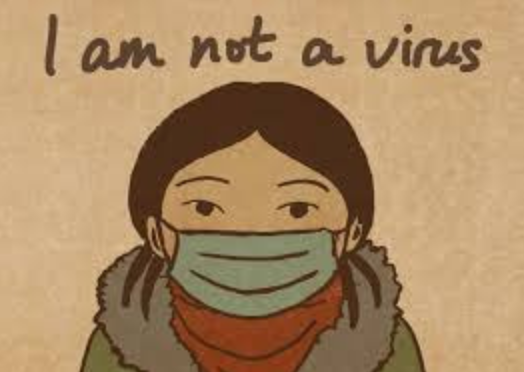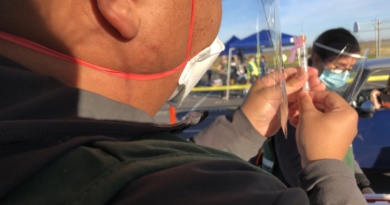Davis school board passes resolution condemning racism against Asian Americans and Pacific Islanders; Asian students share their experiences
PHOTO: Lisa Wool-Rim Sjöblom is a Korean Swedish illustrator and graphic artist who is addressing the issue of anti-Asian racism during COVID-19 through images on her Instagram @chung.woolrim.
By Allyson Kang,
BlueDevilHUB.com Editor-in-Chief–
The Davis Joint Unified School District passed Resolution 46-21, “Condemning and Combating Racism, Xenophobia and Intolerance Against Asian Americans and Pacific Islanders,” on March 4. All five board trustees voted in favor of its passage.
“There have been more vicious attacks reported by API across the country, in our region, and in our city of Davis. […] I think that [the resolution] is a very important first step and should not be the only step that we take,” trustee Vigdis Asmundson said.
The resolution was started by Lisa Yep Salinas, a Chinese American woman in Yolo County who was attacked by anti-Asian racists six times since COVID-19 started. People verbally attacked her, called her racial slurs, and blamed her for COVID-19. Some even tried to physically harm her, forcing Salinas to defend herself with a grocery cart.
“Being attacked is just absolutely traumatic. It’s horrible. I cannot go shopping by myself, and that’s what I would do for my family,” Salinas said.
In order to combat this, she worked on a resolution condemning anti-API racism and contacted the Yolo County Board of Supervisors, who passed it. As Salinas shared her story, she learned many others had similar experiences. Since then, other districts, now including the DJUSD, have also passed resolutions.
Chinese American junior Rebecca Chang believes the resolution is a “really great step.” Chang was at the public library with a couple of her Asian friends shortly after schools closed when she met a student who was “ranting loudly about how Chinese people caused the pandemic by eating trash and how Chinese Americans shouldn’t be in America and other anti-Chinese rhetoric,” Chang said.
“Thankfully he was only ranting and didn’t physically do anything, but my friends and I were really scared. […] I was afraid to get involved because he might physically come after one of us,” Chang said.
Last year, Chinese American Andrea Leung was getting graduation gowns with a Chinese American friend. On the Davis High campus, another senior “walked by and coughed on our face, he wasn’t even wearing a mask, […] he coughed and laughed at us,” Leung said. “I had this feeling of like, ‘I am as American as you, why do you need to treat me this way.’”
Another Asian American student, who is not Chinese and wished to remain anonymous, said he experienced anti-Asian racism even before the pandemic.
“I remember a student shouting ‘go back to your country China man’ when they didn’t even know my ethnicity. Kinda bothersome that a student has this kind of racism. But I didn’t want to talk to them because [they would] probably bite back, so I just walked along,” he said.
Since COVID-19, students have experienced microaggressions in the form of “bat eating jokes.” Chinese American senior Riley Liu has also heard people calling COVID-19 the “China virus.”
“Just because people don’t get hate crimed in Davis doesn’t mean people can’t be racist towards Asians and other POC. So I urge students at the high school […] to speak up when you see these microaggressions,” Liu said.
DJUSD climate coordinator Kate Snow shared a similar message. Snow explains that it is difficult to measure Asian discrimination in particular since not many people have started conversations about it.
“African Americans […] have felt, known, talked about, screamed about, been activists about […] anti-black racism. And yet when George Floyd was killed, it kicked off a whole bunch of new conversations. A whole lot of people stopped being able to ignore it. […] I think the same is true about anti-Asian discrimination and harm,” Snow said.
Salinas, who started the resolution, shared that she deeply appreciated all the support from her city and county representatives and hoped to impress on students “to register to vote and to vote because your voice is so powerful and important in making sure that […] your rights are protected,” Salinas said.
To report discrimination or harassment, students can start an official complaint at the Student Support Services Office.


